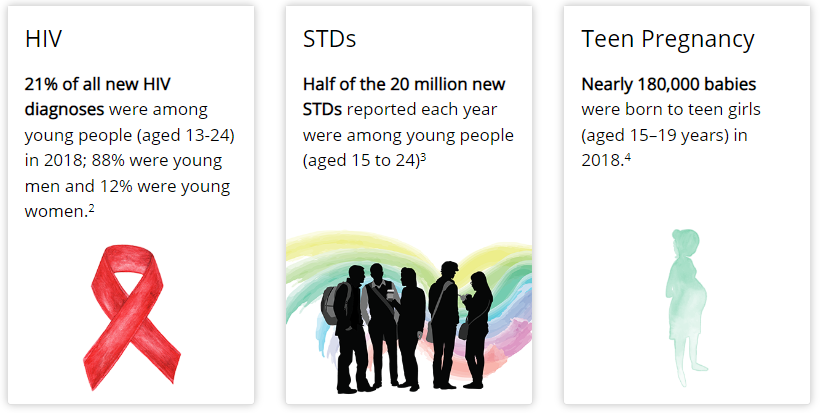Background
Risky sexual behaviors are all activities that increases an individual’s risk of getting sexually transmitted infection (STIs), misuse of contraceptives, and unplanned pregnancy. Young people are at an increased risk of engaging in reckless intimacy which they regrate later in life. The main causes of such mannerism include the nature of youth as being strong and wanting to explore more on their sexuality, use and abuse of drugs, peer pressure, and other behaviors such as frequent clubbing and partying (Crooks et al., 2020). The primary influences of the risky sexual behaviors include the changing culture reflected in the media sensuality.
Although there is plenty of studies that have been done on risky sexual behavior there is paucity of knowledge that explains effective ways of protecting the young people from negative repercussions of sex. In the United States 45% and 55% of sexually active girls and boys of ages 14 to 19 years report having multiple partners (U.S. Department of Health & Human Services, 2021). Most young people are also less likely to remember using condoms especially when they are under the influence of drugs. The consequences of such behavior are high number of STIs and teen pregnancy as indicated in figure 1. In Mexico, 19.2% of young people have been initiated to sex of which only 58% of young men and 42% of women feel satisfaction (Casique, 2020). Moreover, risky sexual behavior is costly to the individuals and taxpayers. For instance, a person on antiretroviral drugs consumes at least $1,800 during their lifetime. The nation also losses productive people due to time wasted time and death of young people

Advance Practice Roles and Management Strategies for Change
The two best strategies to effect change at the community level is through media and policy. Notably, the internet and other mass entertainment has a significant role in exposing young people to pornography and other inappropriate sensual behaviors (Crooks et al., 2020). Yet, it is also a powerful tool in changing the lives of people through showing the dangers of risky sexual behaviors. Regarding advance practice roles and management, it is vital to transform the community through federal policy and systems. For instance, money should be allocated for sex education workshops for young people to influence their change. Moreover, the rules for controlling media consumption among young people such as the parental advisory should be implemented.
Community and Social Resources that Affect Risky Sexual Behavior
The resources that positively influence prevention of risky sexual behavior in the society include schools and religious institutions. For example, the Christian and Islamic teachings all cautions people against promiscuity. The other positive resource are parents and leaders who are morally upright as they can mentor young people. There are also books, movies and television programs that teach young people to change their behavior. The resources that negatively influence prevention of the social issue include some entertainment places such as bar, clubs, and lodgings which encourages drug consumption and provide a place for people engaging in sex.
Changes or Enhancements in Community-Related Services
It is vital to enhance community services such as access to healthcare that deal with sexual reproductive health for teenage minors. Particularly, it is important for hospital to stop insisting on having consent from adults or identification documents before according service. The other enhancement is to have an anonymous community call center where teenagers can make calls and get help on all sexual issues. There should also be ambulance specifically kept to help young people who get into crisis such as after getting an abortion.
Strategic Plan to Reduce Prevalence
The social ecological method presents one of the best models that is effective in strategizing how to minimize the prevalence of risky sexual behavior. The model was developed by Bronfenbrenner in 1997 and helps in organizing factors based on their level of influence. There are three primary goals for the plan: 1. To increase the age at which young people have their first sexual encounter by at least one year within the next five years. 2. To minimize the chances of teenagers using the money they have for drugs by 20% within the next ten years. 3. To reach 90% of adolescent from ages 10 years to 19 years with education on sexual reproductive health.
References
ACT for Youth Center for Community Action. (2020). Youth statistics: Sexual health. ACT for Youth. Web.
Casique. (2020). Correlates of satisfaction with sexual initiation among Mexican adolescents.International Perspectives on Sexual and Reproductive Health, 46, 163. Web.
Crooks, R. L., Baur, K., & Widman, L. (2020). Our sexuality. Cengage Learning.
U.S. Department of Health & Human Services. (2021). Sexual risk behaviors can lead to HIV, STDs, & teen pregnancy. Centers for Disease Control and Prevention. Web.